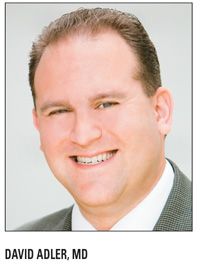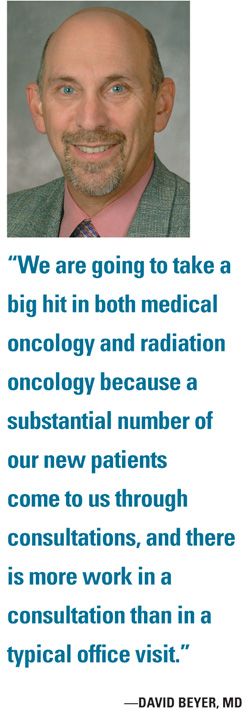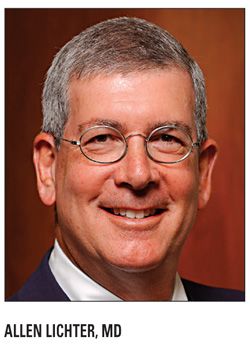Oncology dodges CMS worst case scenario
Oncology specialists heaved a sigh of relief in November, after analysts from ASCO and ASTRO concluded that the worst had, in fact, not happened. A 6% cut proposed last summer by the Centers for Medicare & Medicaid Services to affect medical oncology practice in 2010 under Medicare’s final physician fee schedule would instead be only 1%, according to an October announcement made by CMS.
Oncology specialists heaved a sigh of relief in November, after analysts from ASCO and ASTRO concluded that the worst had, in fact, not happened. A 6% cut proposed last summer by the Centers for Medicare & Medicaid Services to affect medical oncology practice in 2010 under Medicare’s final physician fee schedule would instead be only 1%, according to an October announcement made by CMS. Additional cuts would be phased in over four years, bringing the total reduction in Medicare payments to an estimated 5% to 6%, but these cuts would be easier to take because they could be absorbed over several years, pundits agree.

In the days and weeks following the announcement, leaders in the oncology community claimed victory. If the full weight of the proposed changes had struck oncology, the profession-and its patients-might have been drastically changed.
ASCO projections indicated that some practices in communities that are largely made up of older patients reliant on Medicare would simply “not have been able to make ends meet” and would have ceased to exist, said Allen Lichter, MD, ASCO CEO. Other practices might have been able to consult with cancer patients but would not have been able to actually provide treatments. Consequently, many patients would have been forced to receive treatments at large hospitals.
“The hospital capacity would not have been there to take care of all the patients, and if that had happened, there would have been delays in treatment and patients would have suffered,” Dr. Lichter said.
The crux of the problem was CMS’s proposal to change the equipment utilization rate. If the initial proposal-to adjust the equipment utilization rate for radiation therapy equipment from 50% to 90% for equipment costing more than $1 million-had been put in place, radiation oncology payments would have been cut by 19%.
A study of freestanding radiation oncology centers, conducted last summer for ASTRO, found that actual equipment use was well below the proposed 90% utilization rate CMS planned to apply. Actual rates ranged from 18% to 63%, depending on the type of equipment, such as the Gamma Knife on the low end to accelerators delivering 4 to 6 MV on the high end.
Raising CMS’s current assumed utilization rate from 50% to 90% would have drastically cut reimbursement for these centers. To prove that point, ASTRO ran 2008 claims data from a sample of practices across the country to determine the effect the proposed rule change would have had on rural and suburban cancer centers. The change would have reduced average revenue in a range between 18% and 31%. Payment for some services at these centers would have been cut up to 44%.

“The proposed cuts in Medicare would have made it much more difficult for community practices to continue to see their Medicare patients,” said Dr. Lichter, who noted that this could have had a major effect on access to care. “Oncology care in this country is heavily invested in community practice. About 80% of patients with cancer are treated in the communities and about 20% are treated in major academic practices.”
A survey by ASTRO in July of community-based practices found that two out of five said they would have to shut down their operations if such drastic cuts were put into effect. Some 47% of rural practices said they would close and 60% with multiple locations said they would consolidate. Among the community practices that said they would stay open, 54% said they would no longer accept Medicare patients and 68% said they would limit the number of Medicare patients they treat.
“That was a powerful story that dramatically showed how these proposed cuts would have impacted radiation oncology, especially at a time when Congress was promoting healthcare reform as a way to expand access to care, said David Adler, MD, assistant director of government relations for ASTRO.
The ASTRO survey found that among practices that would close or consolidate, 43% said their patients would have to travel more than 50 miles round-trip for radiation therapy. In rural areas, 81% reported that their patients would have to travel at least as far to receive treatment. In total, 97% of community practices said the quality of care would suffer as the result of the change in the equipment utilization rate.
These and other data helped ASTRO persuade CMS to exempt radiation oncology from the proposed change. Overall, the other adjustments made by CMS allowed oncology to escape with only a 5% to 6% cut over four years.
“We have to view this as good news in the context of what might have been, because what was proposed quite frankly would have been devastating to our specialty,” said David Beyer, MD, vice president of Arizona Oncology Services, which operates six freestanding radiology oncology centers in the Phoenix area. But now as the dust settles, the comfortable feeling that oncology has escaped the worst is giving way to concerns about the cuts coming next year and the following three. Built into the 1,600 pages of the final 2010 physician fee schedule were the details of how the CMS changes would impact oncology practice.
A key concern for oncologists is that the fee schedule for next year will contain no consultation codes. These codes, which provide reimbursement for the time oncologists spend analyzing patient data from referred patients and consulting with their physicians, have been entirely eliminated in both the inpatient and the outpatient/office settings. Consultation codes are gone for all specialists, including cardiologists and orthopedic surgeons, not just oncologists. But sharing the pain doesn’t make it any less unfair, Dr. Beyer said.
“This is CMS’s way of re-valuing some of our practice expenses, and we don’t believe it correctly values us,” he said.
The relative value units (RVUs) that once defined the effort oncologists and other specialists put into consultations have now been allocated RVUs for new and established office visit services, initial hospital visits, and initial nursing facility visits. This change means that physicians will be able to bill an initial hospital care or initial nursing facility care code for their first visit during a patient’s admission to the hospital or nursing facility rather than use the consultation codes they otherwise would have used.
“We are going to take a big hit in both medical oncology and radiation oncology because a substantial number of our new patients come to us through consultations and there is more work in a consultation than in a typical office visit,” Dr. Beyer said.

Along with the cuts, however, CMS came up with a change that oncology leaders say is purely positive. ASCO had been supporting for years the elimination of drug costs in CMS calculations. The agency’s decision to eliminate these costs, as part of its 2010 physician fee schedule, is likely to result in positive annual updates, instead of the yearly cuts that have been the subject of annual congressional interventions to undo. When all are tallied, however, the changes in the physician fee schedule for next year put oncology a step backward. And oncology may not yet be out of the woods. Still looming, as this article went to press, was a reimbursement cut mandated years ago by Congress as part of the sustainable growth rate (SGR) formula that defines annual modifications of Medicare payments to oncologists and all other physicians. Successive Congresses have been putting off annual cuts in recent years, causing them to snowball to what would be a 21% cut beginning January 1, 2010, for Medicare payments to all physicians regardless of specialty.
Roscoe Morton, MD, a medical oncologist in a 15-physician group practice in Des Moines, Iowa, believes the SGR presents a great threat to oncology, as it does to the whole practice of medicine. “I think we’d all like to see it properly fixed, but given the current budget situation, nobody has the political clout to fix it for the long term,” Dr. Morton said. “I think we will see a one-year reprieve, as we have seen in the past.”